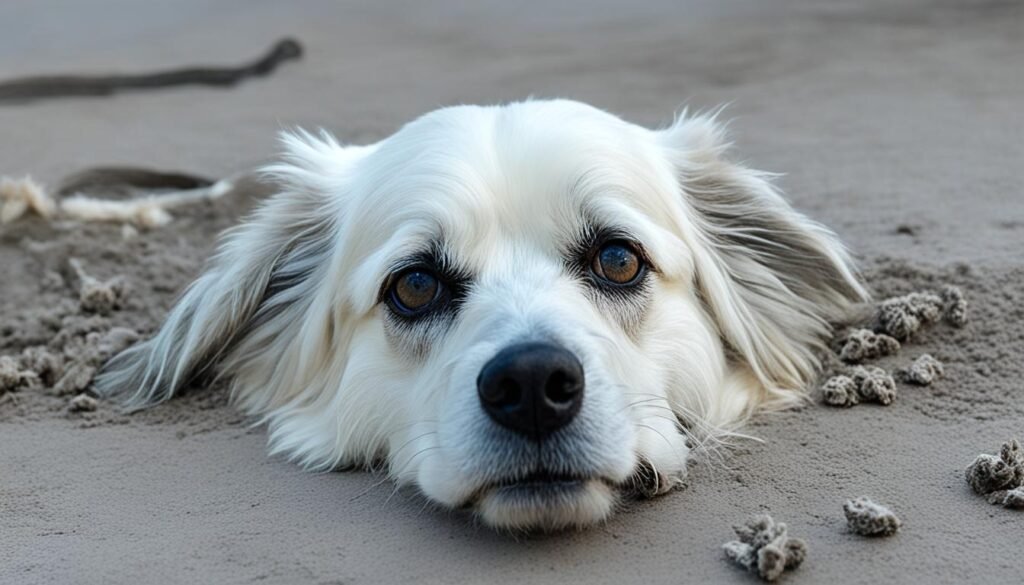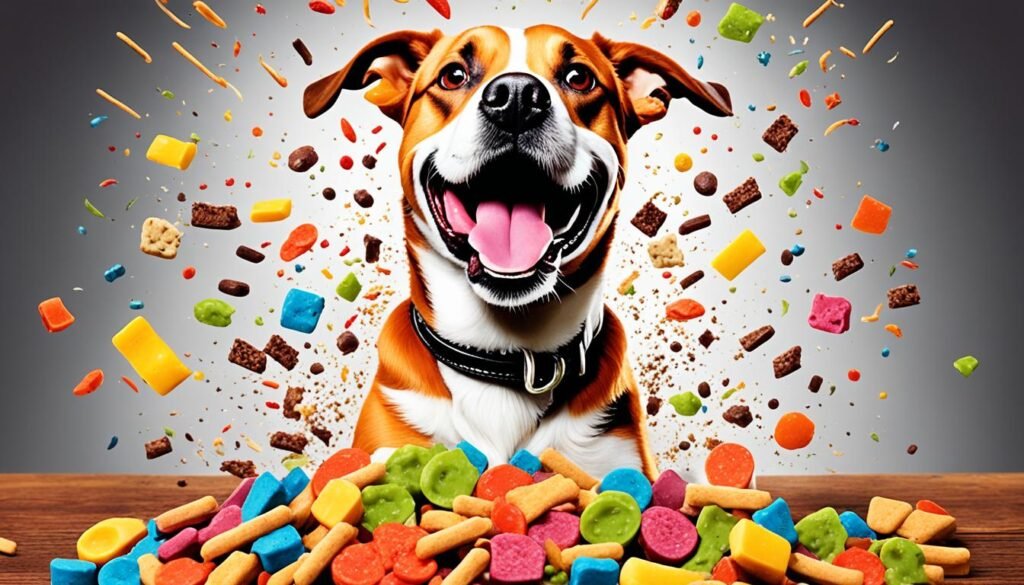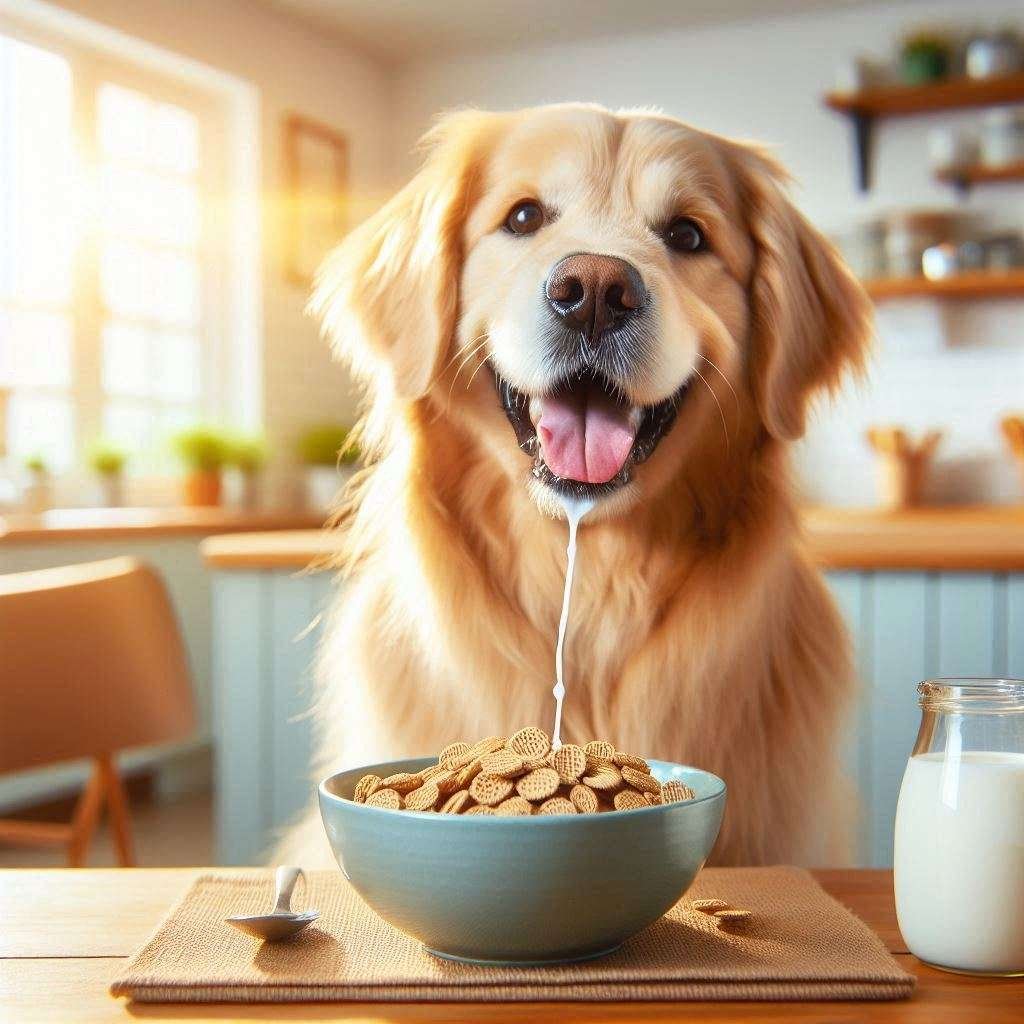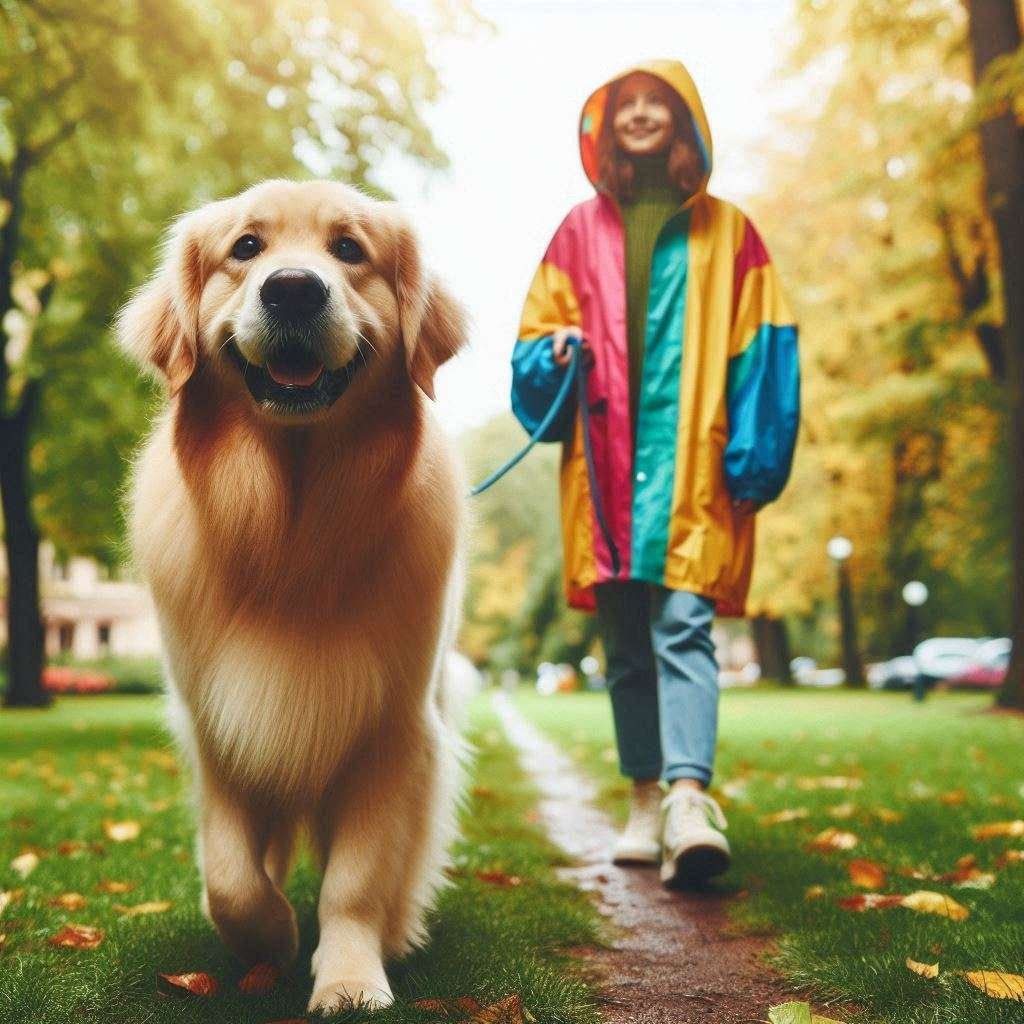Is your dog having trouble gaining weight? You’re not alone. Many dog owners look for ways to help their pets gain weight. But what’s the best way to do it? We’ll look into why dogs lose weight, what foods can help, and how to get your dog back to a healthy size. What can i feed my dog to gain weight?

Key Takeaways
- Understand the factors that can lead to weight loss in dogs, such as dietary deficiencies, medical conditions, and stress.
- Discover nutrient-dense “superfoods” that can help your dog gain weight in a healthy way, including sweet potatoes, peanut butter, and cottage cheese.
- Learn how to create an appealing feeding routine and environment to stimulate your dog’s appetite and encourage weight gain.
- Recognize the signs of nutritional deficiencies and the importance of providing a balanced, high-quality diet for your canine companion.
- Explore the role of exercise in maintaining a healthy weight and building muscle mass in dogs.
Why is My Dog Underweight?
If your pup is having trouble gaining weight, there could be several reasons. Some dogs are picky eaters, making it hard to keep them at a healthy weight. Stress from changes in their environment or the addition of a new family member can also affect their appetite and lead to weight loss.
Picky Eating Habits
A picky eater dog might not like certain foods, making it hard to get enough calories. This could be due to food allergies, dental problems, or just their personal taste.
Stress and Environmental Changes
Dog stress symptoms like changes in appetite can happen when dogs face changes in their routine or home. Moving, getting a new family member, or even traveling can make them not want to eat.
Underlying Health Issues
Sometimes, dog health issues weight loss is the main problem. Issues like inflammatory bowel disease, kidney disease, or dental problems can make it hard for dogs to stay at a healthy weight. It’s key to check for any medical issues with a vet’s help.
Age-Related Challenges
Older dogs may face underweight senior dog challenges. They might have less sense of smell and taste, and move less, which can make eating less appealing and gaining weight harder.
If your dog is finding it hard to gain weight, working with your vet is crucial. They can help find out why and create a plan to help your dog get to a healthy weight safely.
Determining Your Dog’s Ideal Weight
Finding the right weight for your dog is key for their health. The perfect weight depends on breed, age, and how active they are. Talking to your vet is the best way to find out what’s healthy for your dog.
The Body Condition Score (BCS) is a useful tool to check your dog’s weight. It rates body fat on a scale of 1 to 9, with 4-5 being perfect. By checking your dog’s ribs, waistline, and belly, you can see if they’re at a good weight.
For example, Labrador Retrievers should weigh between 55 to 80 pounds. Mixed-breed dogs don’t have a set ideal weight because they’re unique. Keeping your dog at the right weight can make them live longer. Studies show they live 1.8 years more than heavier dogs.
It’s important to see your vet regularly to talk about your dog’s weight and body condition. Your vet can give advice on the ideal weight for your dog’s breed. They can also help you keep your dog at a healthy weight.
Signs of Nutritional Deficiencies
It’s important to know the signs of nutritional deficiencies in your dog. Weight loss and skin problems are just a few signs that your dog might not be getting enough nutrients. Spotting these signs early can help you fix any problems and keep your dog healthy.
Weight Loss
Weight loss in dogs can mean they’re not getting the right nutrients. Things like how active they are and their metabolism affect their food needs. An unbalanced diet can cause weight changes, including being underweight.
Skin and Coat Issues
Signs like dry skin, slow hair growth, and a dull coat can mean your dog lacks important minerals and protein. These nutrients are key for a healthy coat.
Lethargy and Weak Muscle Development
If your dog seems tired and has weak muscles, it might be due to not getting enough carbs or other nutrients. Being less active and having weak muscles can be signs of poor nutrition.
Digestive and Dental Problems
Changes in your dog’s poop can mean digestive issues that affect how well they absorb nutrients. Dental problems like red gums, bad breath, and plaque can also hint at nutritional shortfalls.
Weakened Immune System
A weak immune system in dogs can come from not getting enough nutrients. This can lead to slow healing, more infections, and allergies. A balanced diet is key for your dog’s health and fighting off illnesses.

Spotting nutritional deficiencies in your dog is the first step to fixing any issues. It ensures your dog gets the right food for good health and happiness.
What Can I Feed My Dog to Gain Weight?
If your dog is underweight, adding certain human foods to their diet can help. Foods like sweet potatoes, pumpkin, peanut butter, and cottage cheese are great. They are high in calories and taste good to dogs.
Sweet Potatoes and Pumpkin
Sweet potatoes and pumpkin are great for weight gain in dogs. They are full of fiber and healthy fats. You can roast sweet potato cubes or mash cooked pumpkin to add to their meals.
Peanut Butter and Cottage Cheese
Peanut butter and cottage cheese are tasty and high in calories. Add a spoonful of peanut butter or cottage cheese to their food. Make sure to pick unsweetened, natural options without salt or sugar.
Eggs and Brown Rice
Eggs are packed with protein, and brown rice gives dogs complex carbs for energy. Mix scrambled eggs into their food or give them hard-boiled eggs as a snack. Brown rice can also be added to homemade food for weight gain.
Always add new foods slowly and in small amounts to prevent stomach upset. Talk to your vet to make sure your dog gets the right balance of calories and nutrients for healthy weight gain.

“Proper nutrition is key for helping underweight dogs gain weight in a healthy way. By incorporating nutrient-dense human foods like sweet potatoes, peanut butter, and eggs, you can give your pup the extra calories and protein they need.”
Choosing High-Quality Dog Food
Choosing the right food is key for your dog’s healthy weight gain. Premium dog food brands offer essential nutrients for a balanced diet. Look for foods with high-quality protein from meat, fish, and eggs. Also, healthy fats from fish oil or flaxseed are important.
Protein-Rich Ingredients
Protein is vital for dogs with lots of energy needs. It keeps muscles strong and helps with growth and repair. Choose dog food with animal-based proteins like eggs and muscle meat for better digestibility.
Healthy Fats
Fats give dogs lots of calories and are key for energy. Pick dog food with healthy fats like omega-3 and omega-6 fatty acids. These fats support your dog’s health and help with weight gain.
| Nutrient | Recommended Level | Importance for Weight Gain |
|---|---|---|
| Protein | Minimum 18% of total calories | Helps maintain lean body mass and muscle development |
| Fat | Maximum 82.5g/1,000 kcal | Provides concentrated energy to support weight gain |
| Carbohydrates | Moderate levels from grains, fruits, and vegetables | Serve as a source of readily available energy |
When changing your dog’s food, do it slowly to avoid problems like pancreatitis. High-quality, nutrient-rich dog food supports your dog’s healthy weight gain and overall health.
Strategies to Increase Your Dog’s Appetite
Making mealtime fun can help your dog eat more. By understanding what they like and making meals enjoyable, you can boost their appetite. This can lead to healthy weight gain.
Hand-Feeding and Wet Food
Hand-feeding can make your dog more interested in their food. It adds a personal touch and makes the experience more engaging. Also, using high-quality wet dog food can make meals tastier and more aromatic.
Consistent Feeding Schedule
Feeding your dog at the same times every day can help manage their appetite. This approach trains their body to be hungry at those times. It makes mealtime more predictable for them.
Flavorful Toppings and Warm Food
Adding tasty toppings like boiled chicken, non-fat broth, or parmesan cheese can make food more appealing. Warming the food also makes it smell better, which can attract your dog.
Using these tips can help get your dog to eat more and support their weight gain. Always talk to your vet if you’re worried about your dog’s eating habits or health.
The Importance of Exercise
Regular exercise is key for your dog’s health, even when you’re helping them gain weight. Some might think a lazy life is best, but remember, the aim is to add muscle. By getting your dog moving, you help them gain weight and stay fit and muscular.
A study by Banfield Pet Hospital found that a healthy weight can add up to 2.5 years to a dog’s life. This shows how vital exercise for underweight dogs is for their health and happiness.
There are many ways to keep your dog active, like brisk walks, playtime, swimming, or fetch. The goal is to pick activities they like and slowly increase their strength and stamina.
Adding regular exercise for underweight dogs to their routine helps with weight gain and muscle building. This approach makes your pet healthier, happier, and more lively.
Always talk to your vet to create a safe exercise plan for your dog, especially if they’re underweight or have health issues. With the right plan, you can help your pet get a healthy, muscular body and live a longer, more active life.
Conclusion
Keeping your dog at a healthy weight is key for their health. By figuring out why your dog might be underweight, like picky eating or health issues, you can help them gain weight safely.
Signs your dog might not be getting enough nutrients include losing weight, skin problems, feeling tired, and stomach issues. Adding foods like sweet potatoes, peanut butter, and eggs can really help. Also, choosing good dog food with proteins, fats, and carbs is important for gaining weight and building muscle.
Talking to your vet, setting a regular feeding schedule, and making sure your dog exercises are important steps. These actions will help your dog gain weight safely and keep it off. By doing these things, you can support your dog’s health and help them live a long, happy life.


